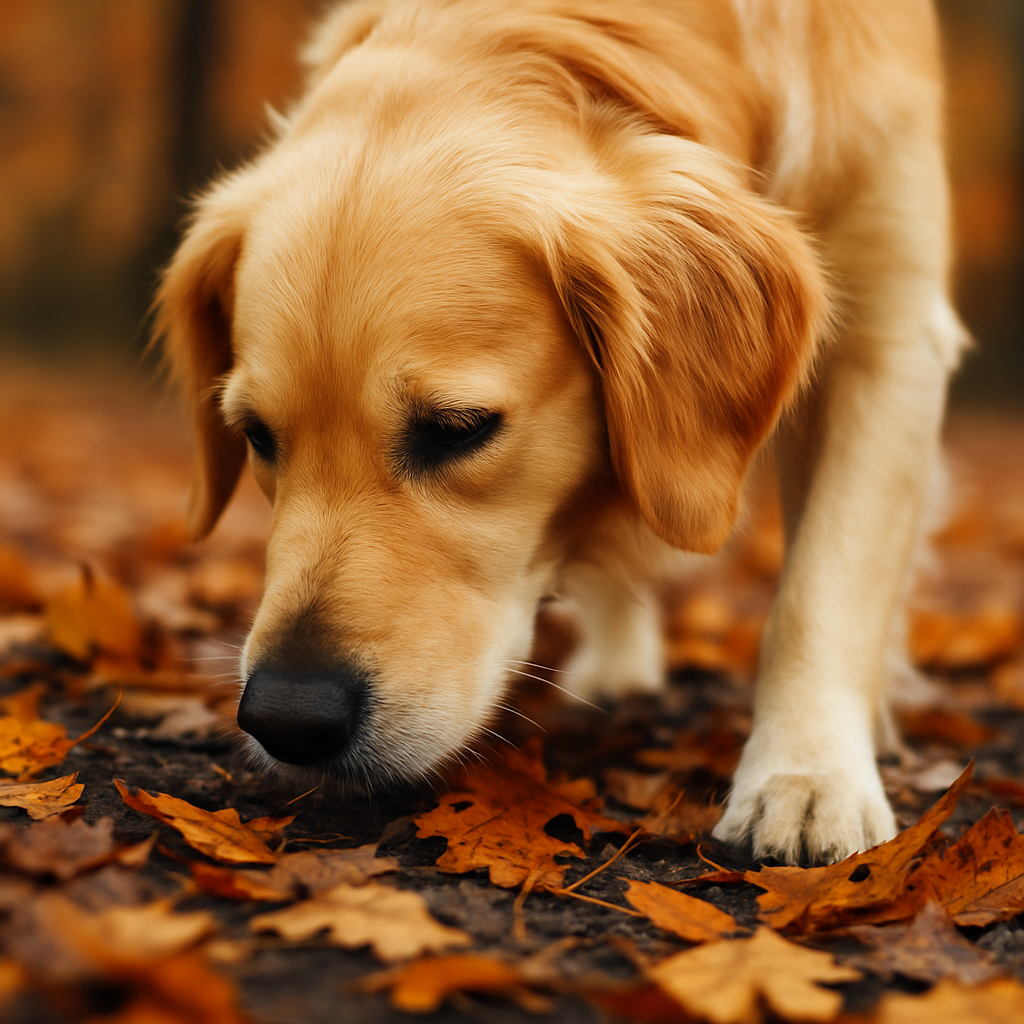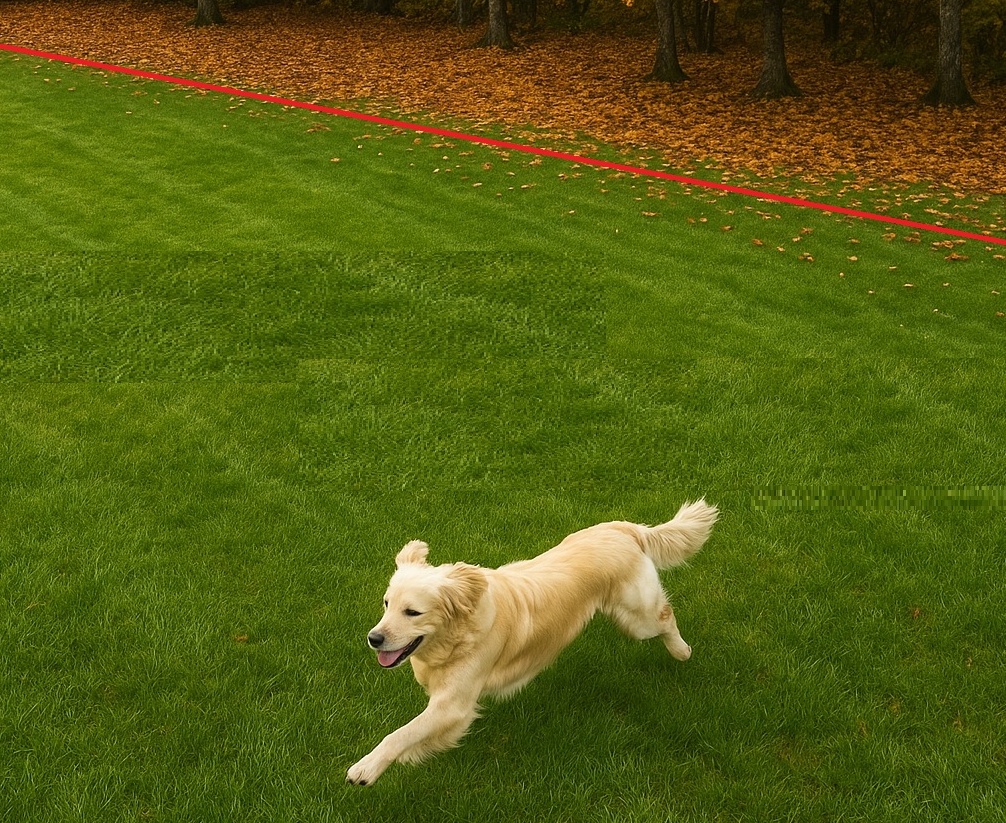Why Dog Safety Around Acorns Matters
Are acorns poisonous to dogs? Unfortunately, yes — acorns contain tannins that can make your dog very ill if eaten. As autumn arrives and oak trees drop their seeds, it’s important to understand the risks and know how to keep your pet safe outdoors. This year, 2025, was predicted to be a “mast year”, meaning oaks are producing an unusually high number of acorns due to last year’s warm spring and mild summer.
While acorns may seem harmless, they can be toxic to dogs, and owners should take extra precautions. Dogs are naturally curious; they love to sniff, chew, and explore. To a playful pet, an acorn might look like a crunchy treat or a fun toy — but ingestion can cause serious illness.
At DogFence Ltd, we often receive calls from owners who are looking for ways to keep their pets safe outdoors during autumn. With the right awareness and simple garden adjustments, dog safety around acorns doesn’t have to be complicated.

Are Acorns Poisonous to Dogs and How Can You Prevent It?
Yes — acorns are poisonous to dogs. They contain tannins, a type of chemical that can irritate your dog’s digestive tract and, in higher doses, damage the kidneys and liver. Even small amounts can trigger vomiting or diarrhoea, while larger quantities or repeated exposure can lead to dehydration and long-term organ stress.
Some breeds — such as Labradors and Spaniels — are more prone to scavenging, which makes them particularly vulnerable. Puppies are also at higher risk, as they’re still learning what’s safe to eat.
If you’re unsure whether acorns are growing nearby, check your garden regularly during autumn and early winter. For more information on the toxicity of acorns, visit the PDSA advice page on autumn hazards.
Symptoms of Acorn Poisoning in Dogs
Recognising the early signs of acorn poisoning is key to preventing more serious illness. Symptoms can appear within a few hours of ingestion and may include:
-
Drooling or excessive salivation
-
Vomiting or retching
-
Diarrhoea (sometimes with traces of blood)
-
Loss of appetite
-
Abdominal pain, whining, or restlessness
-
Lethargy or unusual tiredness
-
Signs of dehydration (sunken eyes, dry gums)
If you notice any of these symptoms, contact your vet immediately. Even if your dog seems to recover, internal irritation can persist, so a professional check-up is essential.
Treatment for Acorn Poisoning
If ingestion is recent, your vet may induce vomiting or administer activated charcoal to help absorb toxins. In more serious cases, IV fluids, pain relief, and blood tests may be required to support the kidneys and liver.
Recovery times vary, but most dogs recover fully with prompt treatment. Your vet may recommend follow-up testing to monitor kidney and liver health over the following weeks. Always keep your dog hydrated and offer a bland diet during recovery.
How an Invisible Dog Fence Can Help
One of the most effective ways to prevent acorn poisoning in your garden is to create no-go zones around oak trees or wooded areas using an invisible dog fence.
At DogFence Ltd, our systems are designed to blend seamlessly into your property. A thin wire runs discreetly underground or along your boundary, creating an invisible line. Your dog wears a lightweight, waterproof receiver collar that gives a gentle warning tone when they approach the restricted area, followed by a mild correction if they continue.
This allows you to:
-
Exclude high-risk areas, such as where acorns drop, while still allowing play in safe zones.
-
Protect your garden design, as there’s no need for visible fencing.
-
Give your dog freedom and security, knowing they won’t stray into danger.
Every system is custom-designed for your property. Whether you have a small garden or acres of land, we can design a layout that keeps your pet safe — not just from acorns, but from ponds, driveways, and other hazards.
To learn more about how our systems operate, visit our detailed How It Works page.

FAQ
Q: Are acorns poisonous to dogs?
A: Yes, acorns contain tannins that can irritate the stomach and, in severe cases, cause kidney or liver damage.
Q: How can I stop my dog eating acorns in the garden?
A: You can use an invisible dog fence to exclude oak trees or rake up fallen acorns regularly.
Q: What should I do if my dog eats an acorn?
A: Contact your vet immediately. Early treatment prevents complications and supports a full recovery.
Q: Can a DogFence system protect against other garden hazards?
A: Absolutely. DogFence layouts can be customised to exclude ponds, compost heaps, or driveways — keeping your pet safe year-round.
Autumn Dog Safety Tips
Alongside using an invisible dog fence, here are some practical ways to improve dog fence garden safety this season:
-
Rake up fallen acorns daily, especially if you have multiple oak trees.
-
Keep your dog on a lead in woodland areas during peak acorn fall (October–November).
-
Avoid stagnant puddles or mouldy leaves, which can harbour bacteria and fungi.
-
Provide toys and stimulation, so your dog isn’t tempted to chew outdoor debris.
-
Train recall and “leave it” commands, rewarding your dog for ignoring acorns.
Did you know? Acorns aren’t the only autumn hazard — conkers, mushrooms, and blue-green algae in ponds can also be dangerous. Awareness and a safe garden layout can make all the difference.
Keep Your Dog Safe This Autumn
Your garden should be a place where your dog can run freely and safely — not a source of stress. By combining vigilance with smart containment technology, you can enjoy peace of mind all season long.
A DogFence invisible dog fence offers an adaptable, humane solution that keeps your dog happy, healthy, and safe — no matter what autumn brings.
Ready to Keep Your Pet Safe?
Call us on
01628 476475
|
Message us on WhatsApp
|
Request a Free Quote Online
{
“@context”: “https://schema.org”,
“@type”: “FAQPage”,
“mainEntity”: [
{
“@type”: “Question”,
“name”: “Are acorns poisonous to dogs?”,
“acceptedAnswer”: {
“@type”: “Answer”,
“text”: “Yes, acorns contain tannins that can irritate the stomach and, in severe cases, cause kidney or liver damage.”
}
},
{
“@type”: “Question”,
“name”: “How can I stop my dog eating acorns in the garden?”,
“acceptedAnswer”: {
“@type”: “Answer”,
“text”: “You can use an invisible dog fence to exclude oak trees or rake up fallen acorns regularly.”
}
},
{
“@type”: “Question”,
“name”: “What should I do if my dog eats an acorn?”,
“acceptedAnswer”: {
“@type”: “Answer”,
“text”: “Contact your vet immediately. Early treatment prevents complications and supports a full recovery.”
}
},
{
“@type”: “Question”,
“name”: “Can a DogFence system protect against other garden hazards?”,
“acceptedAnswer”: {
“@type”: “Answer”,
“text”: “Yes, DogFence layouts can be customised to exclude ponds, compost heaps, or driveways, helping to keep your pet safe all year.”
}
}
]
}
